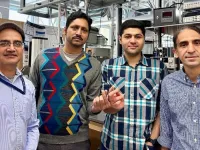(Press-News.org) A new study from Stanford University, published Jan. 19 in Patient Education and Counseling, evaluates the effectiveness of patient mindset training on provider learning and behavior.
Past research shows that what patients think, believe, or expect regarding medical care can influence care outcomes. Patients also have better outcomes when they have more adaptive mindsets about their treatments (e.g., “this treatment will be effective”), their bodies (e.g., “my body is capable”), their illnesses (e.g. “diabetes is manageable”), and their care team (e.g., “I am in good hands”). Patient mindset can be influenced by the attitudes of and encouragement given by care teams – from front desk staff to clinicians. In the interest of leveraging the potential power of mindset in medical care, researchers from Stanford University developed and conducted a “Medicine Plus Mindset” training at five Bay Area primary care clinics.
The researchers delivered the two-hour training and then conducted a follow-up session one month later to reinforce the training. Afterward, participants reported a better understanding of mindset and a greater appreciation for its influence, and reported using the training when communicating with patients.
Lead author Kari Leibowitz and senior author Alia Crum, associate professor of psychology in the School of Humanities and Sciences – both of the Stanford Mind & Body Lab – have extensive experience researching how patient mindset affects health outcomes. In this research, they and their co-authors hoped to evaluate how medical care teams would respond to and implement patient mindset training.
“The goal of what we’re trying to do is say these mindsets do actually matter for things like patient experience and patient satisfaction,” said Leibowitz. “But they also matter for objective things like patient health outcomes.”
“Care teams have an intuitive sense that their patients’ mindsets matter and, in their best moments, they are shaping patient mindsets for the better,” said Crum. “But they don’t often realize the science behind just how important mindsets are. They also typically don’t have a framework for how to identify those mindsets and cultivate them in their patients skillfully, ethically, and deliberately.”
Patient mindsets affect health care outcomes
“Mindsets are core assumptions that we have about things in the world and how they work,” said Leibowitz. “Medicine is effective, medicine is harmful. Cancer is a catastrophe, cancer is an opportunity.”
Those mindsets, said Leibowitz, can cause a cascade of psychological processes, which can positively or negatively affect patient outcomes.
As such, small changes in a care provider’s words can change patient mindsets for the better. For instance, a provider might say “the vast majority of patients do not experience side effects from this treatment” instead of “a small percentage of patients experience side effects from this treatment.” Additionally, when treating a patient with a chronic illness, such as diabetes, a provider might say “this diet has really worked for people in your situation” instead of simply prescribing the diet. If a patient is experiencing side effects of a treatment, they might benefit from knowing that those could be signs that the treatment is working, not merely an unfortunate consequence.
However, medical care staff generally receive no formal training on shaping patient mindsets. In this study, a team of researchers and clinicians delivered the Medicine Plus Mindset training to primary care staff, including all members of the care team, from physician to front desk staff. The training included information about strategies and opportunities for shaping patient mindset and tips for communicating warmth and competence, and care teams were encouraged to share their experiences seeing mindset affect patient outcomes.
Training care teams to change patient mindsets
The team first conducted a pilot study, delivering the training to 27 staff members at two Bay Area clinics. After completing training development, they delivered the training to 186 staff members at Stanford Primary Care and in a primary care clinic within the Alameda Health System.
The Medicine Plus Mindset training differs from standard medical communication training in that it doesn’t focus on specific scripts. Instead, it focuses on underscoring the value of mindsets in shaping health outcomes and providing high-level frameworks for which mindsets matter most.
“One thing that I like about the Medicine Plus Mindset program compared to scripted responses is that it creates some flexibility for me to understand who I’m speaking to,” said Larry Kwan, a study co-author and clinical assistant professor at Stanford Medicine. “Scripting doesn’t allow for that.”
The researchers taught care teams that they ultimately want to help patients cultivate useful mindsets about their treatment, the capability of their care team, their bodies, and their illnesses. The care teams also worked together to share ways that they have successfully changed patient mindsets in the past.
“We are mindset experts, but all of the providers are experts in their jobs and in providing patient care,” said Leibowitz. “The tool is meant to be used flexibly, and these team members can draw on their own experience, insight, and wisdom to figure out ways to deploy it.”
Evaluating care team experiences
After the initial training and follow-up session, the researchers evaluated the training by assessing self-reported care team reaction (directly after the training), learning outcomes (before and one month after the training), and behavior (before and one month after the training).
Participants overwhelmingly reported the training as being both “very enjoyable” and “very useful.” They also reported increases in the belief that patient mindsets influence health care outcomes, and in their ability to shape patient mindsets.
“After the training, our participants felt like they were better able to recognize and shape patient mindsets in practice,” said Leibowitz.
In the weeks following the training, care team members reported using the training to shape patient mindset; they also reported increased satisfaction in their own jobs. The research team also anecdotally noted that the training was particularly helpful to those in non-provider roles, such as medical assistants.
“They play a really big role in the encounter, but maybe don’t always feel like they have the opportunity to make a big difference,” said Leibowitz. “A lot of them reported feeling like now they can really see how their words and actions make a difference.”
Future research
While care teams reacted positively to the training, there are limitations. High medical staff turnover could limit the effectiveness of the training, and busy schedules could limit the time available for training. However, physicians and care teams still rate the training highly.
Future areas of study include evaluating the effects of mindset training on patient health outcomes, and implementing the training outside of primary care.
“Patient mindsets are being shaped from the moment they walk in the office to how they are treated at the pharmacy,” said Crum. “That’s why we wanted the training to be as inclusive as possible. We all have a role to play.”
Additional Stanford co-authors include Marcy Winget, director of the Evaluation Sciences Unit in the Division of Primary Care and Population Health at Stanford Medicine; research scientists Cati Brown-Johnson and Nadia Safaeinili; Jonathan G. Shaw, clinical associate professor of medicine in primary care and population health at Stanford Medicine; and Deepa Thakor, clinical assistant professor of medicine in primary care and population health at Stanford Medicine. Additional co-authors are from the University of California, San Francisco, and the University of Zurich. Crum is also a member of Stanford Bio-X, the Wu Tsai Human Performance Alliance, the Maternal & Child Health Research Institute, and the Stanford Cancer Institute.
The work was funded by the Robert Wood Johnson Foundation and the National Institutes of Health.
END
Patient mindset training helps care teams
2024-02-23
ELSE PRESS RELEASES FROM THIS DATE:
Dual-energy harvesting device could power future wireless medical implants
2024-02-23
UNIVERSITY PARK, Pa. — Implantable biomedical devices — like pacemakers, insulin pumps and neurostimulators — are becoming smaller and utilizing wireless technology, but hurdles remain for powering the next-generation implants. A new wireless charging device developed by Penn State scientists could dramatically improve powering capability for implants while still being safe for our bodies, the researchers said.
The new device can harvest energy from magnetic field and ultrasound sources simultaneously, converting this energy to electricity to power implants, the scientists reported in the journal Energy & Environmental ...
Study: ‘Hexaplex’ vaccine aims to boost flu protection
2024-02-23
BUFFALO, N.Y. – Recombinant protein vaccines, like the Novavax vaccine used to fight COVID-19, offer several advantages over conventional vaccines.
They’re easy to precisely produce. They’re safe, and potentially more effective. And they could require smaller doses.
Because of these traits, there is much interest in developing recombinant influenza vaccines. To date, however, the Food and Drug Administration has approved only one such vaccine.
A University at Bufalo-led research team hopes to add to that number. It is developing a new recombinant flu vaccine – described ...
New structural insights could lead to mechanical enhancement in alloys
2024-02-23
UNIVERSITY PARK, Pa. — A new class of metallic materials with potential applications in airplane turbines, nuclear reactors and equipment for space exploration can withstand extreme temperatures and resist fractures, but scientists haven’t understood why until now. According to a new study co-led by Penn State researchers, the answer could relate to the material’s short-range order, or the local arrangement of atoms within a material. This knowledge could lead to further improvement in the mechanical performance and damage tolerance of these materials, the researchers said, leading in turn to advancements in the safety and reliability of next-generation ...
New research challenges conventional picture of Parkinson's disease
2024-02-23
Parkinson's disease, the second most common type of progressive dementia after Alzheimer's disease, affects nearly 1 million people in the U.S. and an estimated 10 million individuals worldwide. Each year, close to 90,000 new cases of Parkinson’s disease are diagnosed in the U.S.
In a new study, Jeffrey Kordower, director of the ASU-Banner Neurodegenerative Disease Research Center, and his colleagues unveil pivotal insights into the progression of Parkinson's disease, presenting new hope for patients battling the severely debilitating disorder.
The research highlights the role of a critical protein called tau in the early stages of the ...
Dairy cows fed botanicals-supplemented diets use energy more efficiently
2024-02-23
UNIVERSITY PARK, Pa. — Supplementing the feed of high-producing dairy cows with the botanical extract capsicum oleoresin, obtained from chili peppers, or a combination of that extract and clove oil resulted in the animals using feed energy more efficiently and emitting less methane from their largest stomach, according to a new study conducted by Penn State researchers.
Adding those substances, sometimes referred to as essential oils, to the cattle’s rations resulted in improved efficiency of energy utilization in peak-lactation dairy cows. According to Alex Hristov, distinguished professor of dairy nutrition, ...
Aston University receives nearly half a million pounds to create safer and greener batteries
2024-02-23
• Researchers to explore the use of gel electrolyte materials to improve lithium-ion batteries
• The batteries are the most commonly used in electric vehicles and electronics
• Will use non-harmful, non-flammable and renewably sourced materials for next generation battery technologies.
Aston University researchers are to explore the use of gel electrolyte materials to make lithium-ion batteries - the most commonly used for electric vehicles and electronics - safer and less environmentally damaging.
The University has received a grant of £443,058 from the Engineering and Physical Sciences Research ...
New study shows glycan sugar coating of IgG immunoglobulin can predict cardiovascular health
2024-02-23
When people hear about predicting heart disease, most will think of cholesterol levels. While cholesterol is a major contributor to heart disease, a recent study from Brigham and Women's Hospital, a founding member of Mass General Brigham, found that a glycan biomarker of IgG is also an important predictor for cardiovascular diseases (CVD). The researchers studied the sugar coatings on an antibody known as immunoglobulin G (IgG), which is implicated in the immune responses associated with chronic inflammation among participants in two case-control studies. The results of this investigation provide another biomarker for identifying risk of CVD, which could lead to earlier diagnosis ...
Sir Peter Rigby appointed as honorary chair of Aston University’s new Digital Futures Institute
2024-02-23
Sir Peter was knighted for his contribution to IT and businesses in the Midlands in 2002
He will provide guidance, support, advocacy and strong links to industry in his role
The Institute will drive digital innovation and ensure digital inclusion.
Aston University is delighted to announce that it has appointed one of the UK’s most respected and successful business leaders, Sir Peter Rigby, as honorary chair of its new Digital Futures Institute.
The announcement of Sir Peter’s appointment was made in front of guests at the inaugural lecture given by Professor Abdul Sadka, director of the Digital ...
Yale School of Medicine receives a $575,000 grant from PolyBio Research Foundation to fund long COVID research
2024-02-23
Yale School of Medicine and its Center for Infection & Immunity (CII) are receiving a $575,000 grant from PolyBio Research Foundation to fund Long COVID research. The grant—issued via PolyBio’s LongCovid Research Consortium (LCRC)— will support a collaboration to define mechanisms by which the SARS-CoV-2 virus can persist for long periods of time in tissue and blood.
There is growing evidence that SARS-CoV-2 may not fully clear from Long COVID patients after initial infection. Instead, reservoirs of the virus can persist in patient tissue for months or even years, with recent research finding the SARS-CoV-2 ...
Common plant could help reduce food insecurity, researchers find
2024-02-23
UNIVERSITY PARK, Pa. — An often-overlooked water plant that can double its biomass in two days, capture nitrogen from the air — making it a valuable green fertilizer — and be fed to poultry and livestock could serve as life-saving food for humans in the event of a catastrophe or disaster, a new study led by Penn State researchers suggests.
Native to the eastern U.S., the plant, azolla caroliniana Willd — commonly known as Carolina azolla — also could ease food insecurity in the near future, according to findings ...






